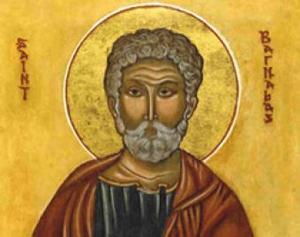With the Church we pray
O God, who decreed that Saint Barnabas, a man filled with faith and the Holy Spirit, should be set apart to convert nations, grant that the Gospel of Christ, which he strenuously preached, may be faithfully proclaimed by word and by deed.
Saint Barnabas died in AD 61. What we know of Barnabas comes most from the Acts of the Apostles, which we heard in today’s Mass readings but he also shows in several of Saint Paul’s Letters.
Who was Barnabas? Some scholars say that Barnabas was the cousin of Saint Mark on the basis of Colossians 4. We know he was of the tribe of Levi (making him a member of the priestly class), a native of Cyprus and a landowner there before selling the land to support the Church in Jerusalem, Moreover, he was trained in the Christian faith and a teacher of the same (see Acts 13).
It was Barnabas who showed sympathy for Paul following his conversion and provided for Paul’s formation as a Christian apostle. Some date Paul’s conversion period in the mid to late 30s. You might say after the Holy Spirit, without Barnabas there would be no Saint Paul. Hence Barnabas being called the “son of encouragement,” or the “son of exhortation,” or sometimes even translated as the “son of consolation.” It is written in the Acts, he “… saw the grace of God, he rejoiced and encored them all to remain faithful to the Lord in firmness of heart….”
The Church ranks Barnabas as an apostle but he was not among the 12; his name is noted in several lists naming the 72 disciples. What has been given to us is the fact that he was with the 12 and the 72, spent much time in Jerusalem learning the faith, encountering the Lord, and was an eloquent preaching. In ecclesial history there is such a category as prophets and doctors of the faith and the Church in Antioch puts Barnabas at the top.
The Church in Jerusalem sent Barnabas to Antioch –the third most important city in the Roman empire– (where those who belonged to Christ were first called Christians) to exercise episcopal ministry. It is in Antioch that Paul had co-labored for the Kingdom with Barnabas.
Tradition holds that the tomb of Saint Barnabas was found and that the body of the Apostle had resting on his breast a copy of Matthew’s gospel. There are ecclesial traditions that name Barnabas as the first bishop of Milan and Tertullian identifies him as the author of the Letter to the Hebrews. Neither of these points can be substantiated in the sources. But what we know and accept and praise Barnabas for is is witness to Jesus as Lord and Savior and for his courage to be a missionary.
Saint Barnabas is the patron saint of Cyprus, Antioch, against hailstorms, invoked as peacemaker.
